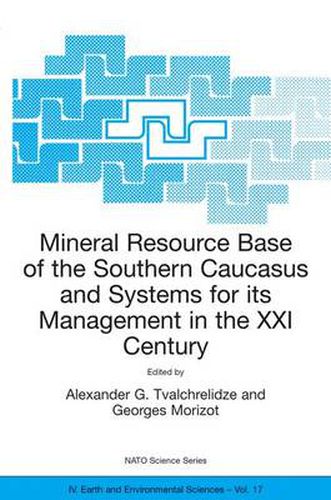Readings Newsletter
Become a Readings Member to make your shopping experience even easier.
Sign in or sign up for free!
You’re not far away from qualifying for FREE standard shipping within Australia
You’ve qualified for FREE standard shipping within Australia
The cart is loading…






This title is printed to order. This book may have been self-published. If so, we cannot guarantee the quality of the content. In the main most books will have gone through the editing process however some may not. We therefore suggest that you be aware of this before ordering this book. If in doubt check either the author or publisher’s details as we are unable to accept any returns unless they are faulty. Please contact us if you have any questions.
The NATO Advanced Research Workshop Mineral Resource Base of the Southern Caucasus and Systems for its Management in the XXI Century was held in Tbilisi on April 3-6, 2001. The workshop was financed by the NATO Science Programme and financially supported by the Open Society - Georgia Foundation. By the end of the XX century the new states of the Southern Caucasus (Azerbaijan, Armenia and Georgia) found themselves in the lowest phase of a severe structural crisis. Belonging to the same geopolitical space and having the common economic history during the XIX and XX centuries, these countries will be able to overcome this crisis and to integrate into the world community only step-by-step, exploiting their resource bases and developing competitive branches of industries. Moreover, in our opinion, such conception is the only alternative to the spontaneous economical chaos. Solution of this problem seems to be impossible without close international collaboration. From this point of view, the idea of regional alliances where regional actors would be linked by a general, non-contradictory macroeconomic model seems to be the only possibility for sustainable development. Creation of The Southern Caucasus Alliance (SCA) where Georgia, Azerbaijan, Armenia and Turkey would find their place could be possible only in case if the economic reality and economic interests would weigh down nationalistic doctrines of political isolationism.
$9.00 standard shipping within Australia
FREE standard shipping within Australia for orders over $100.00
Express & International shipping calculated at checkout
This title is printed to order. This book may have been self-published. If so, we cannot guarantee the quality of the content. In the main most books will have gone through the editing process however some may not. We therefore suggest that you be aware of this before ordering this book. If in doubt check either the author or publisher’s details as we are unable to accept any returns unless they are faulty. Please contact us if you have any questions.
The NATO Advanced Research Workshop Mineral Resource Base of the Southern Caucasus and Systems for its Management in the XXI Century was held in Tbilisi on April 3-6, 2001. The workshop was financed by the NATO Science Programme and financially supported by the Open Society - Georgia Foundation. By the end of the XX century the new states of the Southern Caucasus (Azerbaijan, Armenia and Georgia) found themselves in the lowest phase of a severe structural crisis. Belonging to the same geopolitical space and having the common economic history during the XIX and XX centuries, these countries will be able to overcome this crisis and to integrate into the world community only step-by-step, exploiting their resource bases and developing competitive branches of industries. Moreover, in our opinion, such conception is the only alternative to the spontaneous economical chaos. Solution of this problem seems to be impossible without close international collaboration. From this point of view, the idea of regional alliances where regional actors would be linked by a general, non-contradictory macroeconomic model seems to be the only possibility for sustainable development. Creation of The Southern Caucasus Alliance (SCA) where Georgia, Azerbaijan, Armenia and Turkey would find their place could be possible only in case if the economic reality and economic interests would weigh down nationalistic doctrines of political isolationism.